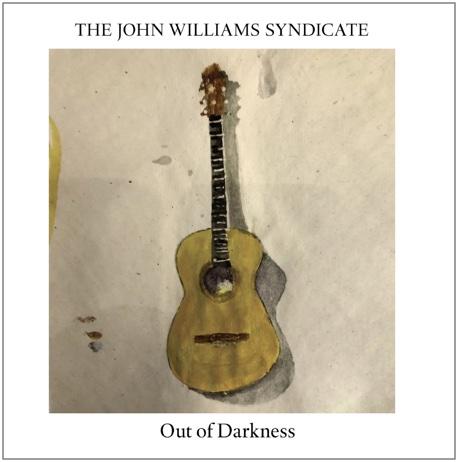
SEO – search engine optimization; it’s a hugely important factor in having an online presence. This particular John Williams has spent a long (and hugely productive) time under the radar in the music business. Now he’s released an album under his own name and he has to compete with a world-renowned classical guitarist and an equally-renowned film soundtrack composer. John Williams of the John Williams Syndicate has plugged records, produced records and BBC sessions, headed up an A&R department and made his own records. So it’s about time to make a few calls to former clients, and a few new discoveries, and work on that solo project in the shed at the bottom of the garden.
There are a lot of things to admire about “Out of Darkness”; as you would expect, the quality of the playing is masterful and the standard of the arrangements and production is superb. As well as pulling in vocal contributions from Petula Clark and Claudia Brücken and a co-write with the legendary Iain Matthews, John also enlists upcoming singers Slicko DiCaprio, Amber Prothero and Isabella Coulstock for lead and backing vocals on the album. Which brings me to the only minor criticism I have; with so many different singers and varied musical stylings, it’s difficult to find a sense of musical cohesion across the album as a whole, although there is a theme of renewal, springing out from the penultimate song, “Nothing” which, unusually, has some lyrical popular culture references set against a seventies singer-songwriter arrangement (maybe a hint of Al Stewart) with a vocal that hints at Stephen ‘Tintin’ Duffy’s Lilac Time period. Everything else on the album is a consequence of this rebirth.
Picking out a few standout moments, “Spanish Song”, co-written with Adrian York, Isabella Coulstock and Slicko DiCaprio, is the most contemporary pop song on “Out of the Darkness” with a Latin tinge and some interesting Spanish/English counterpoint vocals. The album’s final song, “Don’t Give Up on Me”, also has a Latin feel; the lyrics are minimal, but the playing is outstanding with lots of mini solos, including a sax/trumpet counterpoint solo; it’s memorable. “You Got Me from Hello” is cool jazz with Latin rhythms in a Carlos Santana/Rob Thomas style, while the piano-led “Luminescent”, with programmed percussion, nods in the direction of early Kate Bush.
This album is a serious musical project from a serious player; even the packaging is lush, with a thirty-two page booklet containing credits, lyrics and some Tim Hobart abstract paintings. The contributions from the established musicians are predictably excellent, but it’s even more gratifying to hear emerging talents like Isabella Coulstock, Amber Prothero and Slicko DiCaprio taking the opportunity to shine.
“Out of Darkness” is out on Friday June 6th on Wulfrun Records (WULFRUN 1).
And just to give you a flavour of the album, here’s the lockdown video for “You Got Me From Hello”:
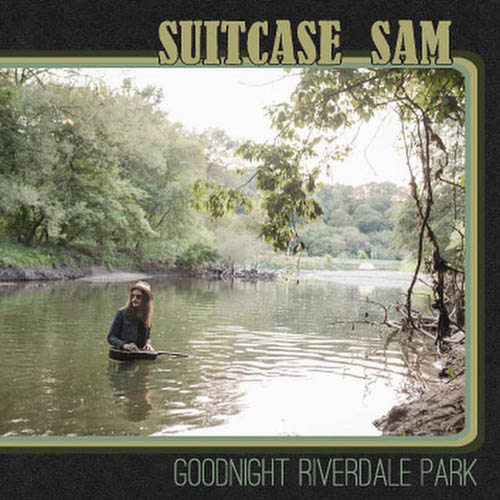
Suitcase Sam – a man with a deliberately cultivated air of mystery. Historical details are sketchy; even his website has him soaking up musical influences three years before he was born. What is clear is that a lot of soaking went on. There are musical elements on the ten songs on “Goodnight Riverdale Park” dating back to the 1920s and covering a wide variety of traditional American musical stylings. A couple of reservations here; this is a very American album and it also looks quite firmly back towards a bygone era. If both of those are your thing, then carry on reading.
In keeping with the retro stylings of the songs, the co-producer of the album, Walter Sobczak eschewed digital recording technology in favour of two and a half inch tape, creating a warmer and slightly rawer sound. More authentic, and that appears to be the main priority with “Goodnight Riverdale Park”.
The album runs through a variety of traditional American styles from the old country feel of “Friday Afternoon” and “Edge of Town” through the string band resonator-led instrumental “The Maple Leaf Stomp”, the Nashville country of “Morning Mail” (a story of waiting for news that never comes), the thirties ragtime feel of “Honey I Know” to the album’s closer, “Tattered Shoes”, a straight-ahead 12-bar blues that builds up to a slide-driven full rock band arrangement that ramps up the tempo for a big final chorus. The album’s opener “Growing Up” and “Frankie and Me” both nod in the direction of The Band with Southern Rock stylings. It’s an eclectic mix, moving effortlessly through styles and pulling in slightly unorthodox instruments such as alto sax, sousaphone, clarinet, piano and organ alongside the more usual string band, resonator, fiddle and pedal steel to provide for Sam’s Jimmie Rodgers and Hank Williams vocal stylings.
“Goodnight Riverdale Park” won’t be for everyone, but if your thing is authentic evocations of classic periods of American musical history, then give this a listen.
“Goodnight Riverdale Park” is released in the UK on Friday March 28th on Curve Music. Meanwhile, here’s the video for “Frankie and Me”:
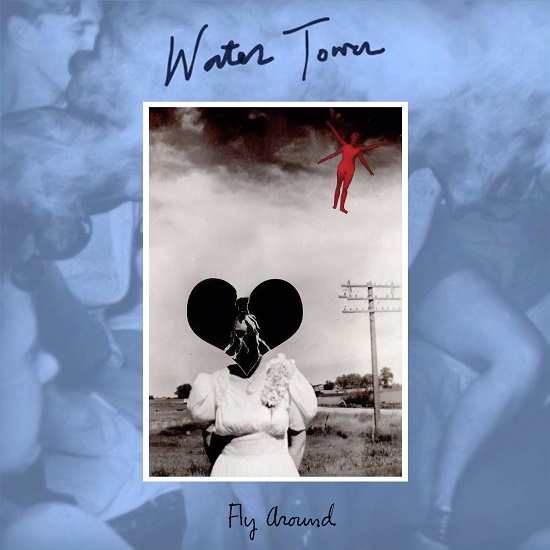
Where do you start with an album like this? Probably with the straightforward stuff. Water Tower (formerly Water Tower Bucket Boys) is the creation of Kenny Feinstein trying to realise his artistic vision. If you take songs created in the bluegrass/string band tradition and throw punk and psychedelia into the mix, then you’re getting somewhere close to understanding this album. Just when you think you can see the shape of the curve, it veers off in a completely different direction. And if you’re interested in picking out influences, “Fly Around” is packed with them.
The first three songs wouldn’t sound out of place on any Americana album. “Fromage” is a traditional string band arrangement telling a story of busking in Paris and doing the Jim Morrison and Debussy tourist thing. “Fly Around” is a spirited piece of ensemble playing reworking a traditional tune, while “Bobcats” is a country/rock waltz featuring fiddles and Beach Boys harmonies. And then there’s a seismic shift.
“Come Down Easy” (a Spacemen 3 cover referencing 1987, Kenny Feinstein’s birth year) still has the fiddles and the harmonies but that’s where the resemblance ends. The rhythmic pulse pounds relentlessly through the wall of sound arrangement as a burbling synth line cuts through the murk and drawled vocals. Is it about drugs? Of course it is, it was co-written by Jason Pierce. After the brief interlude of “Town”, another gentle piece of country rock with a bit of synth, on the theme of moving on, the album goes stratospheric; literally. “Mile High Club” sounds a bit like a Steve Miller intro; Shags Chamberlain plays an analogue synth instrumental evoking the flight from Portland to LA that also features some audio samples of announcements from LAX. It’s a complete curveball, but it makes the following song, “Classic Misdirection” seem less incongruous. It’s a rock song that sets out to pack in as many musical and lyrical clichés as possible in just over three minutes and succeeds effortlessly. I’m not going to spoil the fun for you; just enjoy the cliché treasure hunt.
“Fly Abound” is reworking of the earlier “Fly Around” with new words and melody, while the uptempo string band arrangement of “It’s Wrong”, with its harmonies and mandolin solos describes that all-too-familiar feeling of knowing that something’s wrong, but doing it anyway. Which takes us nicely into the closer “Anthem”. The opening guitar chord has more than a hint of “Won’t Get Fooled Again” before the song erupts into furious folk-punk romp that pulls in elements from the rest of the album for a grandstand finish. The song may be about giving up drugs or starting the cycle again; it definitely leads us back to the beginning of the album, where the cycle starts all over again.
“Fly Around” is a genre-bending smorgasbord of musical and lyrical styles that constantly surprises on its journey from cultural exploration and drug abuse through relocation and back to the beginning of the cycle. You won’t be bored.
“Fly Around” is released in the UK on May 21st on Dutch Records (DUTCH016-2).
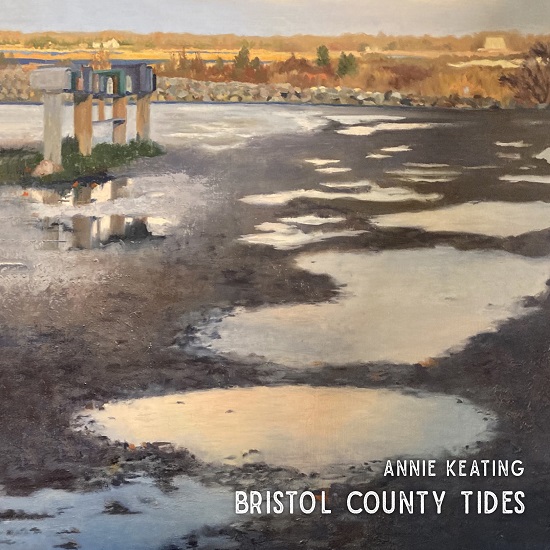
The pandemic may have decimated the live music scene around the world but it’s shown the resilience and adaptability of musicians and other creatives as they found new ways of working and recording that didn’t necessarily involve being in the same room or even on the same continent. Annie Keating’s eighth studio album, “Bristol County Tides” is a product of the pandemic, weaving together threads of the experience such as displacement, new places and relationships, and the importance of taking the positives whenever we can get them. There are a lot of very personal songs on the album, but it has its lighter moments as well.
The album opens with “Third Street”, introducing the small Massachusetts town where Annie moved to ride out the pandemic, and some of its characters. It’s laid-back country rock with some over-driven guitar fills, nice slide and a slightly raw vocal creating the ambience for the (mostly) intensely personal songs that follow, and introducing some of the local characters. “Hank’s Saloon” is in a similar vein, a waltz that celebrates escape from the everyday grind with beer, songs and friends, and builds up to a singalong finish with the same dynamic as a session in your favourite bar. Apart from the mid-tempo rock of “Lucky 13”, using gambling as a metaphor for life, the remainder of the album is intensely personal songs about the life in the time of a pandemic. This could be a depressing experience but, like many of us, Annie has managed to find some positives, creating songs that tease out some of the happier experiences of a short-time exile.
“Bristol County Tides” is a long album. There are fifteen songs telling the story of an involuntary exile, starting with the scene-setter “Third Street” and working through to the valedictory “Bittersweet”, “Shades of Blue” and “Goodbye”. “Bittersweet” sums up the tone of the album as the keening pedal steel emphasises the melancholy of parting from a place and people that have offered sanctuary while returning to a new normal. Another standout is “Doris”, a celebration of Annie’s mum and also a celebration of the immigration that made the USA the country it is. It’s also a beautiful tribute.
The remaining songs are beautifully-crafted expositions of aspects of pandemic life. “Kindred Spirit” is about the experience of finding a soul-mate, “Marigold” symbolises rebirth and renewal and “Nobody Knows” urges us to seize the day and appreciate the good things we have. There’s also a navigational theme running through the album with “Blue Moon Tide”, “Half Mast” and “High Tide” all alluding to piloting a way through the crisis. And absolutely no filler.
Annie Keating has produced a work that encapsulates her experience of the last year and it should ring true for most of us. The songs are well-constructed and the arrangements and musicians give each song the support and the space that they need to shine. Enough said.
“Bristol County Tides” is out now.
Here’s the video for “Marigold”:
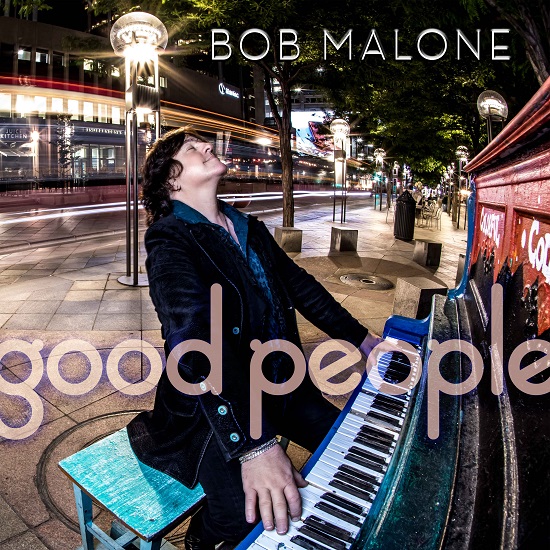
One thing you can guarantee with a Bob Malone album, it will be packed with musical talent. That starts with Bob Malone himself playing acoustic and electric pianos, organ, synth, glockenspiel, stomp box and tambourine; and he’s a pretty good singer in a raw rock/blues style. He’s classically trained, an accomplished writer and arranger and he has a day job (when we’re not in the middle of a pandemic) as keyboard player, accordionist and unwitting pyrotechnics target with John Fogerty’s live band. His solo work reflects his varied musical background, pulling in elements from classical, soul, blues, rock, funk and jazz into a glorious fusion that’s pure Bob Malone.
“Good People”, in common with a lot of recent releases is at least partly a lockdown project put together from recordings at various studios and has a couple of lyrical themes running through it; gratitude for the things that have seen us through the pandemic and a sense of loss for friends and family that didn’t make it through, for whatever reason. The latter theme is particularly important on “Good People”; Lavonne Barnett-Seetal of The Malonettes backing vocal team died in December 2020. Her stunning voice lives on and “Good People” is a fitting tribute.
There are eight original songs on “Good People” and three non-originals; I’m wary of using the word ‘cover’ after a conversation with the wonderful Galician finger-style guitarist, Iago Banet, who makes a powerful case for using the word arrangements instead. Either arrangements or interpretations would be more accurate for the three non-originals on “Good People”. The first reworking is a brave choice of the John Fogerty classic “Bad Moon Rising”. The menace of the original is emphasised by a piano riff that mixes “Come Together” and “Crossroads” and a slightly changed melody. Appropriately enough, it has a real New Orleans feel. Another brave choice is building the Peter Green-era Fleetwood Mac classic “Oh Well” around a turbo-charged piano riff replacing the guitar of the original. It’s a stunning response to everyone who ever told him that “Oh Well” was a guitar tune that wouldn’t work on the piano. And the final non-original, which closes the album, is the long-time live favourite “Tangled Up in Blue”, which is funked-up, rocked-up, Leon Russell-like, show-closing version of the Dylan classic that leaves plenty of room for piano and guitar solos – this studio version has solos from six different guitar players; yep, that’s right, six.
After interpreting the work of classic songwriters such John Fogerty, Peter Green and Bob Dylan, do the Malone originals match up? They certainly do. Bob’s songwriting on “Good People” reflects the times that we’ve lived through since January 2020. The message of the title song is really simple; there’s always reason for positivity because there are always good people around. In a turbulent year like 2020, particularly in the USA, it’s a message that many have forgotten; many thanks for the timely reminder, Bob. The beautiful ballad “My Friends and I”, with its sparse (mainly) piano backing, building up to a gospel choir finish, tells a story of loss that’s familiar to many of us over the last year. It’s an incredibly moving song.
As is “Empty Hallways”, stripped back to piano and strings. The pathos of watching someone slip away is emphasised by Bob singing towards the top of his range and it’s an emotional ride. The Malonettes backing vocals feature heavily again on “The River Gives”, a slow ballad about the danger of depending on unpredictable and dangerous natural resources; it might even be a metaphor for life itself. But don’t get the wrong idea about Bob’s own compositions; they aren’t all downbeat. The instrumental “Prelude and Blues” is an opportunity for Bob and the band to show their prowess in a gentle jazz/blues piece, while “Sound of a Saxophone” using the sax as a metaphor for jazz and music generally builds up to a big full band arrangement with strings and, of course, The Malonettes in full swing.
“Good People” is an album that captures the experience of the plague year perfectly and I think it’s his best yet. It’s a mix of remembrance, numbness, regret and, ultimately, recovery. It’s a bunch of songs that perfectly captures the experience of the last sixteen months and finishes on a note of pure defiance with joyous “Tangled Up in Blue” that you really need to see live. Until that happens, get your ears around this album and prepare for a treat.
“Good People” is released on Friday May 21st, until then here’s a little video for you:


